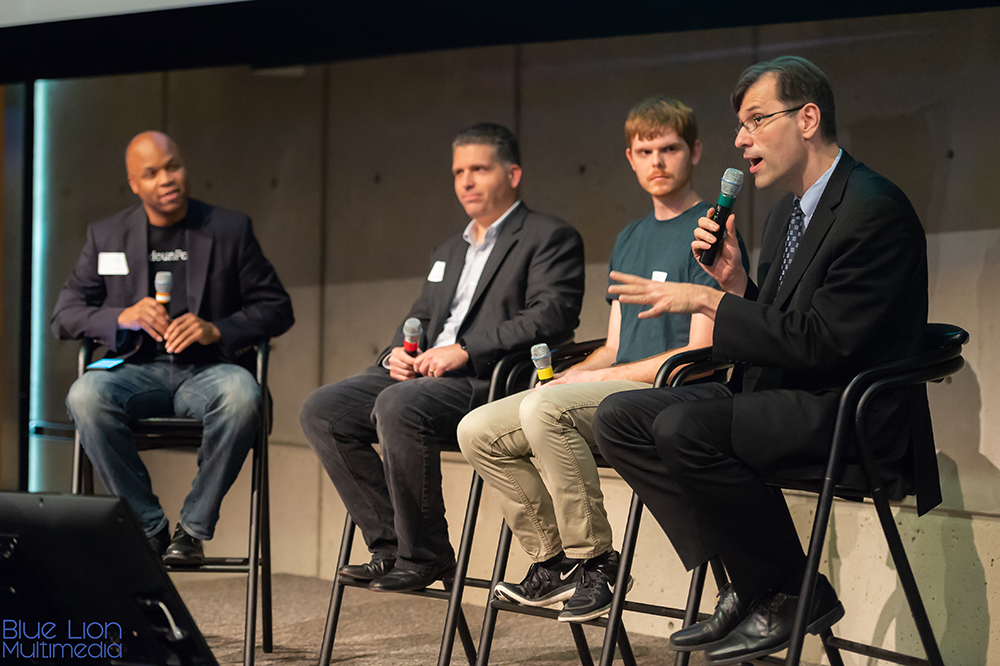The Loudoun Technology Coalition Solicits Advice from a Panel of Blockchain Experts
Written by: Tom Finkenbinder, New Edge Analytics
In May, the Technology Coalition of Loudoun County hosted an event on blockchain. Coalition co-chair Paul McNeal worked with the panelists who represented business process engineering, enterprise IT and data center integration of blockchain, and purposeful blockchain applications built by developers. Generally, the question was asked, “How would a company use blockchain to meet profit-achieving and risk management goals”.
Blockchain is a hot and newsworthy topic. At first look, several key questions were asked. Will blockchain technology be considered the next disruptor? Should you jump on The Blockchain Train or watch for a while? Will blockchain upend industries in the same way Amazon is reshaping brick and mortar retailers and ecommerce?
Economists already agree that blockchain is a general-purpose technology, with a great variety of potential applications across all industries and vertical markets. But the main notion is that blockchain will make trading (economic transactions) more efficient. The most impacted industries in the near term will be in the banking and financial services industry, to cut out the cost of the middle man.

Tech Coalition Blockchain Event Panelists – May 2018 (photo credit: Blue Lion Multimedia)
Paul asked how blockchain technology should be evaluated and implemented in an organization and can blockchain applications be economical for companies of any size. Generally, the advice of the panel was to start small, and the advice applies to companies of all sizes. Pick one business process. Analyze that process and either develop or find and acquire code to implement a blockchain application for your company or internal line of business.
Large companies can afford to buy, lease or build a blockchain transaction system. It is a database application. Look for solutions that can be integrated with a network service provider. If the preference of the IT staff is to outsource the work, treat blockchain as an infrastructure application, such as Storage as a Service, or a private VPN. An organization who has an IT department with programmers, would build an encrypted database on a secured server.
Programmers and managers should treat the project with the same life cycle engineering techniques as any internally generated database application. Use version control. For now, this is a simpler and less expensive strategy to acquire the technology, and to avoid missing or falling behind on potentially ‘the next big thing’. If built correctly the database can be migrated to a vendor or network service provider as application usage grows and upscaling becomes an issue.
Per one of the programmers on the panel, it is not terribly difficult to code scripts and build applications that handle the creation and management of blocks. What is difficult, is managing the Quality Assurance (QA) loop with the code development process. A high degree of confidence needs to be accepted, that the code is bug-free when it goes live. This is most important with applications using tokens. Real money is at stake with cryptocurrencies. There are instances where coding errors are responsible for tokens being sent to bogus accounts or that they simply disappear from the network.
Not unlike databases in use today, an organization must consider the risk of a malicious threat; someone with intent to disrupt a process or steal private information or steal cryptocurrency. This is always a risk with programmers inside the company. So internal authentication, tracking methods and rules of use need to be established. On the outside, the blockchain application needs to be robust so that the transmission channel is fully encrypted, and access to the information is controlled. The default consideration is to treat the database like a vault, the entire resource and appliance should be encrypted and the API’s protected as they are developed.
Finally, and going forward, there is regulatory risk and most people eventually find themselves thinking about the possibility of a cryptocurrency shutdown by the Fed for example. So, if a company decides to use a cryptocurrency for trade, and so as not to be surprised at a minimum, or deprived of a large sum of money, be sure to find a blockchain company who is properly advancing/establishing their cryptocurrency through application to financial regulators. And remember, start small.
Paul wrapped up the event with a challenge to the Chamber and the greater Loudoun community; to implement a blockchain application. He asked to explore use of a blockchain database to manage the voting for awards the Chamber makes to members as an example. Another and slightly more ambitious project would be to establish a unique cryptocurrency for the Chamber – to allow members to conduct transactions with each other and avoid their credit card transaction fees at the point-of-sale. Stay tuned!
The Loudoun Chamber Technology Coalition meets monthly to discuss emerging technologies and the local firms that are leading digital transformation in Loudoun and beyond. Stay informed on upcoming meetings and events by sending an email to Danielle Kabban at dkabban@loudounchamber.org
